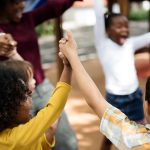By Dr. Brianne Roos & Dr. Carey Borkoski | Originally published in Equity & Access
As we move through the fall, settling into the new routine of this year, the sights, sounds, and smells remind us of our days as athletes. Whether on turf for field hockey or rivers for crew, the fall harkens memories of practice. Now, our students and our own children return to focusing on school, drums, swimming, field hockey, dance, and theater; they are in practice-mode. In our ACE article published in September of this year, we remind readers of the critical role of belonging in our classrooms and offer strategies to practice as we return to school. In this article, we return to critical self-reflection. It is a term and practice that is familiar to educators, supported in the research literature, and yet, we may devote little time to personal practice of self-reflection. Gay and Kirkland (2003) remind us that educators’ reflection about themselves and their teaching contexts are critical to instructional effectiveness. This article furthers the discussion of reflection and offers specific steps individuals can take to begin a personal practice.
Practice and Value of Reflection
What are the attitudes, behaviors, skills, and routines of someone who wants to honor and cultivate belonging? Clear (2018) suggests that when we start with naming an aspirational identity, such as “I want to be a reflective person”, spending a few intentional moments each day to reflect may contribute to a desired habit that deepens over time. Cultivating spaces where our staff and students feel a sense of belonging requires us to first reflect on our own sense of belonging and our supports and barriers. Following are ways to engage in this important self work so that we, as educators and leaders, can show up and participate in conversations and other efforts that contribute to belonging.
Strategies
In our research, we talk with educators in K-12 and higher education about their experiences of belonging, including how they define belonging, and strategies to facilitate belonging in their learning spaces. Three themes emerged from recent conversations that align with our focus on belonging this fall: boundaries, radical acceptance, and measuring what we care about.
Boundaries appear in conversations about belonging because of the connection between vulnerability and belonging (Brown, 2018). That is, it takes courage and willingness to be open and authentic (i.e., vulnerable) to be seen and valued for who we truly are, or to belong. That vulnerability, while critical to belonging, does not mean that we must share all of our secrets with colleagues and students. Rather, we set boundaries. When we think about boundaries, we might consider an exclusionary approach, as in ‘out of bounds’, or being clear about what is not acceptable. We propose reframing boundary setting as an opportunity to describe what is acceptable or what you are willing to do. This can be applied to depth of sharing in conversations or to the extent of acceptable work outside of the school day, and the reframing offers a positive approach to self-care that depends on authenticity. Brene Brown (2022) shares that boundary setting in her company is established by asking two questions: “what is okay?” and “what is not okay?” Thinking about your own contexts, practice asking yourself the same questions and sharing responses with colleagues and students to model how boundary setting contributes to belonging.
When we belong, we feel seen and valued as our authentic selves. Thinking existentially, consider the idea that every person belongs just by virtue of being born, and that together, we form an ever-evolving whole. If we all belong in our humanness, not because of what we do or how we look, we can ascribe to radical acceptance. Radical acceptance is fundamentally simple, suggesting that there is no need to exclude, because we all belong as valued members of a collective whole. Maybe this sounds good in theory, but how does it play out in practice? A colleague values inclusivity in her middle school, truly seeing each student as an integral member of the class and school communities. She says things like, “Welcome back! We are whole when you are here” when students return from being absent. She teaches body language that fosters radical acceptance, such as turning your shoulders to welcome people who approach the lunch table. A colleague in higher ed approaches teaching and learning from the standpoint of radical acceptance by reminding herself that every student is an inherently good person who belongs. This lens shapes her interactions and influences how she connects with students and colleagues. Perhaps you can apply this concept to your context and relationships. How would you complete the following statements? Radical acceptance is____ and I can enact it by _____.
In our research, one of our guests reminded us that simple actions are often the most difficult. Taking that first step towards a goal or habit often feels impossible, until you try. Holding that in mind, we also recognize that our systems demand accountability and assessment. We measure student outcomes through standardized tests, surveys on belonging and social emotional learning, absences, teacher success measures, leadership performance goals and school- and district-level rankings. Another research participant pointed out that we measure what we care about. What does this mean in an environment that requires accountability and state tests? It means, yes, of course we care about student achievement, teacher success and growth, and leadership performance. We also know from our research and experiences as educators that we care about belonging, relationships, community, and inclusion.
It is important that as we move through our busy days that we hold onto belonging as a priority. Consider asking yourself, “What is important to me? What are my priorities?” Then, “What is getting in the way of honoring these priorities?” Take a few minutes each morning to check in with yourself and name one or two priorities for the day. In the middle of the day, check in and see how you are doing with honoring those priorities. If you are not aligned, course correct, and check-in again. This is a journey, not an end point, and belonging is dynamic, complex, and multilayered. We are a work in progress and the only way we can take those hard, simple steps is to engage in critical self-reflection a little every day.
Belonging is complicated
Researchers offer different definitions, perspectives, and identify a multitude of contributing factors. What we know to be true from our experiences and empirical research is that simple acts matter the most. In this article, we have offered a simple practice of asking another question to yourself and others as a way to engage in self-reflection and contribute to belonging. Practicing presence, intentionality, and curiosity offer opportunities to build new habits towards cultivating belonging in yourself, with others, and throughout the learning spaces in which you find yourself. Give it a try, practice – what is the worst thing that could happen? You make a mistake, you learn, and you try again.
Dr. Brianne Roos is an Assistant Professor and director of the undergraduate program in the Department of Speech-Language-Hearing Sciences at Loyola University Maryland. Her career began as a clinician practicing medical speech-language pathology in hospital settings, where her favorite days were spent teaching and supervising students and new clinicians. She has been teaching in higher education for over 15 years and her areas of research include belonging, stress, well-being, and connection for students and faculty. Brianne facilitates workshops about teaching and learning for faculty across disciplines and she particularly enjoys the opportunity to develop and implement holistic onboarding programming to support new faculty. Brianne co-hosts a podcast about belonging, where she learns from a diverse range of guests and whose data contribute to research about belonging during the pandemic, in leadership, and in relationships. Always looking for alignment across established high-impact practices and innovative, engaged pedagogy, Brianne’s publications, presentations, podcasts, and classroom practices connect theoretical support with application that centers the whole person.
Dr. Carey Borkoski is an Associate Professor at Johns Hopkins University where she holds a joint faculty appointment with the School of Education and the Bloomberg School of Public Health. Within the School of Education, she teaches research methods and advises doctoral students in the online EdD program. Her research explores the role of communities, bridging media like podcasts and TedTalks, and storytelling in facilitating student onboarding, promoting deeper learning, and mitigating anxiety around learning and engaging in often unfamiliar academic spaces. Connect with her at momentmcoaching.com
-
Dr. Carey Borkoskihttps://ace-ed.org/author/cborkoski/July 7, 2024
-
Dr. Carey Borkoskihttps://ace-ed.org/author/cborkoski/
-
Dr. Carey Borkoskihttps://ace-ed.org/author/cborkoski/February 27, 2023
-
Dr. Carey Borkoskihttps://ace-ed.org/author/cborkoski/November 18, 2022








